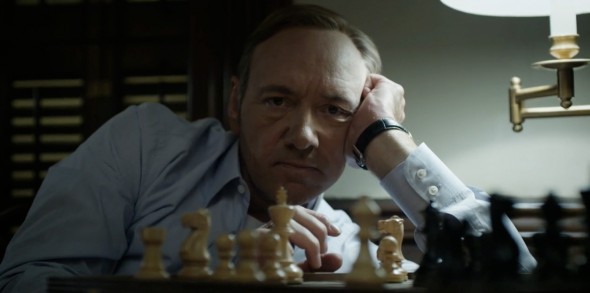Spoilers through Season 1 of House of Cards; some mostly spoiler-free discussions of Episode 1 of Season 2.
The season 2 premiere of Netflix’s House of Cards ends with a reminder of a crucial fact: Frank Underwood is crazy. At this point in the episode, we’re already well aware of that fact, based on the horrible things he has done (and which I won’t spoil here). But throughout the episode, the audience has not been treated to Underwood’s signature move, a snarky aside or quip spoken directly to the audience, unseen by the people around him. Only at the very end, as Frank contemplates his actions in the mirror, does he turn to face us: “Did you think I’d forgotten about you. Perhaps you hoped I had.” And then we’re reminded, oh yeah, this guy talks to people who aren’t really there.
Except, Frank Underwood is probably the least crazy person we know. He is ruthless and cunning, seemingly always one step ahead of his foes. If anything, he is a paragon of rationality, pure calculation and self-interest. When we think of someone who “talks to himself,” we jump to the crazy guy we pass on the street, muttering to himself and proclaiming The End is Nigh. Not the guy who is calmly and coolly maneuvering himself into the halls of power.

But there’s another reason we don’t think Frank is crazy just because he talks to people that aren’t there. We know that the people he’s talking to really are there. Frank isn’t talking to hallucinations; the audience, his audience, is very real, and sitting in your living room. Alone in the House-of-Cards-verse, Frank Underwood can see (and talk) to the unseen audience, sitting in the real world.
In Plato’s “Allegory of the Cave,” we are asked to imagine men who have been shackled inside a cave for their entire lives; there is a fire at the cave’s mouth, and the men can see (and have only ever seen) the shadows cast by objects passing between the fire and the mouth of the cave. For those prisoners, the shadows would be Truth. Knowing nothing else, they would assume that the shadows themselves were objects to be observed. The allegory is commonly used to explain the limitations of our senses, to demonstrate that we are the men in the cave, seeing shadows the wall.
But there’s another part to the Allegory. Plato asks us to imagine that one of the prisoners is released, and allowed to leave the cave. While he would at first be confused, eventually he might begin to see the relationship between the objects he observes and the shadows that had been part of his world. In a sense, he would be in a different world altogether. And if he descended back down into the cave, and tried to tell what he had seen, it’s likely that his old friends would think that he was crazy, that he was imagining things.
Frank can see outside the cave—unlike his fellow inmates in the prison of fiction, Frank knows that he’s being watched. Frank isn’t crazy because when he turns to the camera and talks about how it’s “Hunt, or be hunted”, someone really is listening. He’s even been spotted beyond the Fourth Wall, in our world, planning the Correspondent’s Dinner and sabotaging the Emmys.
https://www.youtube.com/watch?v=LKCmuoRmOp0
Of course, Frank Underwood isn’t the first character to break the Fourth Wall and address the audience directly. Addresses like that range from Plato himself all the way down to Zac Morris and Ferris Bueller.
But what sets Frank Underwood apart from the lovable scamps of the fictional world is his utter disdain for the audience that he addresses. There’s a crucial scene in the final episode of Season 1 that bears scrutiny. Underwood enters a church, and begins to “pray.”
- He looks up, ostensibly to God, saying: “Every time I’ve spoken to you, you’ve never spoken back. But given our mutual disdain, I don’t blame you.”
- He looks out, quipping: “Perhaps I’m speaking to the wrong audience.”
- He looks down, taunting the Devil: “Can you hear me? Are you even capable of language? Or do you only understand depravity?”
With each stage, the point of view of the camera shifts, so that he is addressing it (and us) directly. He’s not talking to God or to the Devil; he can see the World Above, and knows its true nature. He finishes, “There is no solace above or below, only us.”
That “us” is crucial. Because despite his murderous dealings, Frank Underwood is one of us in a way that his fellow characters can never hope to match. We identify with Frank (the other characters on the show are like NPCs in a video game) acting out a script, but with no real internality or consciousness.
That “us” also makes us complicit in Frank’s crimes. His constant asides remind us that we along for this ride; that “we” includes Frank; that “we” lie, cheat, steal, blackmail and murder to get to the top. While few of us can aspire to the sort of evil as Frank Underwood, we are complicit because ultimately we want the same thing that Frank wants. We want his schemes to succeed; we want to see just how much smarter he is than everybody else.
This is just an extreme version of the same trick pulled in nearly every other show featuring an anti-hero protagonist. We sympathize with Walter White or Don Draper, not because they do anything that particularly deserves our sympathy, but because they are our window into the world. We know what they are thinking, and generally why they do the crazy things they do.
What makes Francis Underwood different is that he knows that we know. At the end of that shot in the Season 2 premiere, after reminding us that Frank can still see us watching him, he walks away, leaving only his brand new cufflinks behind, spelling out “F” and “U” to the audience. He’s willing to stand in judgment of us, having wondering aloud if all we know is “depravity.” What makes Frank different is that he left the cave of fiction, took a look at the “higher” world of our reality, and saw only another world to be conquered.

Interesting read. There is a confusing typo/omission in the first line:
Season 2 [premiere] of Netflix’s House of Cards ends…
Love the stuff on the complicity of the audience. Sounds right to me.
I can’t help but think of Pinkie Pie from My Little Pony: Friendship is magic. She’s a character consider crazy in the show, but she’s aware of the fourth wall, making her the most realistic pony around. Of course, she doesn’t disdain the audience like Frank does. I just like thinking about My Little Pony.
Just a nitpick: I don’t love it when we contrast “crazy” with “coldly rational.” Walter White could be coldly rational and was often three steps ahead of everyone else, and he’s not quite the picture of mental health. (See also: Hannibal Lecter.) I don’t like the word crazy in general. It’s too vague.
“He is ruthless and cunning, seemingly always one step ahead of his foes. If anything, he is a paragon of rationality, pure calculation and self-interest.”
Indeed. If that’s your argument for sanity, I’d encourage you to read “The Tell-Tale Heart” again.
In the Marvel comic-verse Deadpool does this often. He’s very aware that he’s in a Comic book/Cartoon/Video Game. He constantly speaks to the readers/viewers/players, and is regarded as crazy by all within the story.